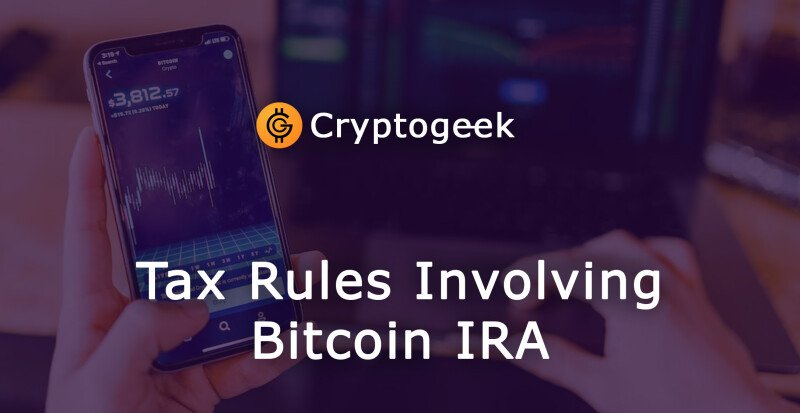Tax Rules Involving Bitcoin IRA


Bitcoin regularly makes headlines due to its remarkable price surge, tempting many individual investors to join in. Surprisingly, you can invest in this new financial asset using a traditional vehicle: an IRA. That's right, you can buy Bitcoin through an individual retirement account.
Exciting, right? Investing in Bitcoin within an IRA has its advantages. However, as with any investment, there are both positives and negatives to weigh before diving in.
Contents
- Bitcoin IRA: What is it?
- Crypto Taxes
- How are taxes implemented in the United States?
- Do you need to claim taxes from your bitcoin holdings?
- Do you need to declare that you owe cryptocurrency?
- Will Bitcoin IRA issue Form 1099?
- Can you avoid taxes by opening a crypto IRA?
- Can the IRS track your Bitcoin IRA activities?
- How should you report your IRA taxes?
- Seek Professional Advice Before Investing
Bitcoin IRA: What is it?
IRAs have gained popularity as an innovative financial tool. They allow holding cryptocurrencies like bitcoin in retirement accounts, offering a new asset class. Despite seeming complex, they boast several advantages that are attractive to individuals planning to diversify their portfolios.
Holding Bitcoin within an IRA allows for tax-deferred growth. This means investors only pay taxes on investment gains once they withdraw funds. Moreover, a Roth IRA having bitcoin offers tax-free growth, implying zero taxes on profits.
Regular IRAs typically cover stocks, bonds, and funds. Bitcoin IRAs expand this by enabling investments in diverse cryptocurrencies such as Bitcoin, Bitcoin Cash, Litecoin, Ripple, and Ethereum. Despite the prevalent association with Bitcoin, these IRAs cater to various cryptocurrencies.
Storing bitcoin in an IRA often comes with an extra layer of security. Custodians manage these IRAs, safeguarding the assets and ensuring their safe storage. This assurance can ease investors' worries about the safety of their investments.
Crypto Taxes
Bitcoin and crypto IRAs offer substantial tax advantages, but understanding crypto taxes and IRA types is crucial. The IRS treats crypto as property, usually subjecting it to capital gains tax, akin to stocks.
Transactions involving selling, spending, or trading crypto incur capital gains tax on profits. On the other hand, activities like mining or staking may trigger income tax. However, Bitcoin IRA taxation varies based on the chosen crypto IRA type, deviating from standard crypto tax rules.
Contributions to a traditional crypto IRA are typically tax-deductible, shielding the crypto from capital gains or income tax. Similarly, up to a specific limit, traditional IRA contributions are tax-deductible, offering yearly tax reductions.
No tax is levied on crypto within a traditional IRA until withdrawal, subjecting the funds to income tax during retirement, often at a lower rate.
How are taxes implemented in the United States?
Since the IRS considers crypto IRAs property, each sale often triggers a taxable transaction, with a few exceptions. Certain cryptocurrency activities may be deemed income and hence subject to income tax when not within crypto IRAs.
When cryptocurrencies are outside these IRAs, capital gains taxes usually apply, especially in events such as:
- Converting crypto to fiat
- Buying goods and services with crypto
- Exchanging crypto on platforms
On the other hand, income tax applies in the following events:
- Receiving crypto via airdrops
- Earning interest from decentralized finance (DeFi) lending
- Mining rewards and fees
- Gains from staking or liquidity pools
- Payment accepted in crypto for goods or services
Do you need to claim taxes from your bitcoin holdings?
Considering a crypto IRA as a long-term investment is crucial to avoid early withdrawals before the IRS-defined retirement age of 59½. Such premature withdrawals might incur tax penalties unless they meet specific hardships recognized by the IRS.
Do you need to declare that you owe cryptocurrency?
Yes, you have to. On your tax return, you're asked to declare cryptocurrency transactions. Form 1040 specifically inquires if you received, sold, sent, exchanged, gifted, or disposed of digital assets within the tax year.
You're expected to respond honestly. Otherwise, you’ll be facing legal consequences for dishonesty. But, according to the IRS, if you used real money to buy “pretend money,” you don't have to answer "yes" to that question.
Divly found that just 1.62% of Americans who own digital money declared the matter to the IRS last year.
Will Bitcoin IRA issue Form 1099?
The IRS 1099 form is a set of tax forms that record various payments made by an entity that isn't your employer. This form, completed by the payer, details these payments and is submitted to you and the IRS, reporting the gains made within the tax year.
Various 1099 forms may be related to your cryptocurrency investments. With increasing federal regulation of cryptocurrency, exchanges might need to comply with tax documentation rules.
Here are more comprehensive descriptions of 1099 documents linked to cryptocurrencies and IRAs:
- 1099-R: Covers distributions from various plans like IRAs and pensions. Issued if there's a distribution of $10 or more, providing IRS, recipient, and tax department information. You'll receive it for eligible distributions from accounts such as IRAs, profit-sharing, retirement plans, pensions, and annuities.
- 1099-B: Shows transactions from broker and barter exchanges, detailing purchase and sales prices, along with gains or losses from crypto sales.
- 1099-INT: Reflects taxable interest income considered as ordinary income.
Can you avoid taxes by opening a crypto IRA?
Investing in a Bitcoin IRA can help avoid certain taxes. You can choose between these IRAs: a Roth or a traditional IRA. Traditional Bitcoin IRAs are tax-deferred, while Roth Bitcoin IRAs offer potential tax-free growth based on the selected assets.
Avoiding taxes on capital gains could save more for retirement than strategies without such protection. However, early distributions before reaching 59½ may incur penalties.
Can the IRS track your Bitcoin IRA activities?
The IRS doesn't track every Bitcoin or crypto transaction directly but relies on individual compliance. Taxation of cryptocurrency began in 2014, focusing on individuals with significant transactions, typically above $20,000 annually.
For instance, the IRS has used court summons to gather exchange data. In one case, they sought information from Circle Internet Financial, a Boston-based crypto exchange, regarding customers with transactions over $20,000 annually from 2016 to 2020, seeking account details and activity records.
Recently, the IRS has sought information from various exchanges through court summons. However, they don’t monitor every crypto transaction directly. Like stocks or bonds, you must disclose cryptocurrency transactions fully on your tax return. Your return should reflect any cryptocurrency dealings.
Private individuals and crypto IRA firms report transactions annually and provide 1099 tax forms. This accountability ensures transparency in cryptocurrency dealings for tax purposes.
How should you report your IRA taxes?
While your funds remain within your Bitcoin IRA, reporting gains or losses on your investments isn't necessary. IRAs offer tax-sheltered status, meaning no taxes are incurred while funds are held within the account. However, upon retirement age, when you start taking distributions from the IRA, potential taxes should be considered.

Seek Professional Advice Before Investing
Bitcoin IRAs present an opportunity for investors who believe in the future of cryptocurrency while seeking tax advantages alongside their profits. Additionally, the familiarity of managing assets within a known account structure adds to their appeal.
However, it's important to note that these IRAs involve higher fees and account minimums than other options. Evaluating whether this trade-off aligns with your financial goals is crucial. Remember, alternative methods exist to hold Bitcoin, such as through regular accounts on platforms like Coinbase or Binance US.
Selecting a custodian warrants careful consideration if you opt for a Bitcoin IRA. Investing only an amount you can stand to lose and adopting a long-term perspective is wise. Envision the investment's potential growth over two decades, ideally exceeding your initial investment.

トップチュートリアル
-
Что такое хард-форк?Jul 27, 2020
-
Стейкинг на Ethereum 2.0 и его основные особенностиAug 01, 2020
-
Инновации на основе блокчейна в сфере энергетикиAug 03, 2020





